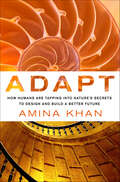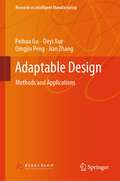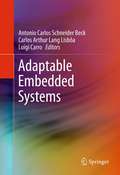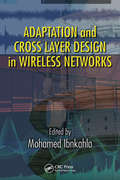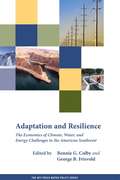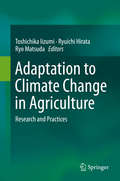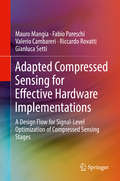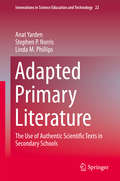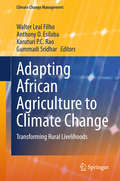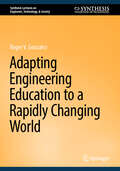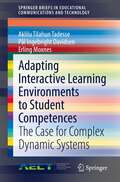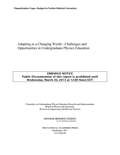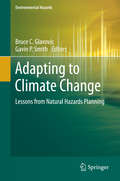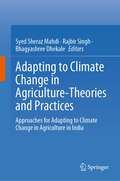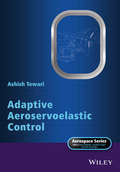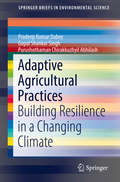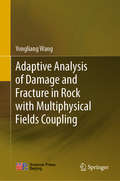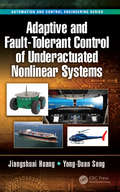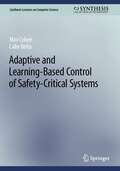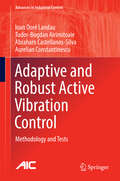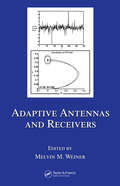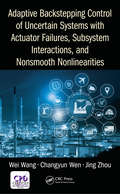- Table View
- List View
Adapt: How Humans Are Tapping into Nature's Secrets to Design and Build a Better Future
by Amina KhanAmina Khan believes that nature does it best. In Adapt, she presents fascinating examples of how nature effortlessly solves the problems that humans attempt to solve with decades worth of the latest and greatest technologies, time, and money. Humans are animals too, and animals are incredibly good at doing more with less. If a fly’s eye can see without hundreds of fancy lenses, and termite mounds can stay cool in the desert without air conditioning, it stands to reason that nature can teach us a thing or two about sustainable technology and innovation. In Khan’s accessible voice, these complex concepts are made simple. There is so much we humans can learn from nature’s billions of years of productive and efficient evolutionary experience. This field is growing rapidly and everyone from architects to biologists to nano-technicians to engineers are paying attention. Results from the simplest tasks, creating Velcro to mimic the sticking power of a burr, to the more complex like maximizing wind power by arranging farms to imitate schools of fish can make a difference and inspire future technological breakthroughs.Adapt shares the weird and wonderful ways that nature has been working smarter and not harder, and how we can too to make billion dollar cross-industrial advances in the very near future.
Adaptable Design: Methods and Applications (Research on Intelligent Manufacturing)
by Peihua Gu Deyi Xue Qingjin Peng Jian ZhangThis book provides a comprehensive discussion of Adaptable Design (AD). It covers the conception, method, and application of AD to the real-world product design. AD's benefits are substantial as it upgrades, reuses, remanufactures and recycles products throughout the product lifecycle. It rapidly adapts the existing design in development of new designs. Key elements of AD include rationalized function structures, adaptable product architectures, adaptable interfaces, and adaptability evaluations. The main feature of AD is adaptability in design methods and product applications with general and specific adaptability. AD has also modeling and evaluating adaptabilities.
Adaptable Embedded Systems
by Luigi Carro Carlos Arthur Lang Lisbôa Antonio Carlos BeckAs embedded systems become more complex, designers face a number of challenges at different levels: they need to boost performance, while keeping energy consumption as low as possible, they need to reuse existent software code, and at the same time they need to take advantage of the extra logic available in the chip, represented by multiple processors working together. This book describes several strategies to achieve such different and interrelated goals, by the use of adaptability. Coverage includes reconfigurable systems, dynamic optimization techniques such as binary translation and trace reuse, new memory architectures including homogeneous and heterogeneous multiprocessor systems, communication issues and NOCs, fault tolerance against fabrication defects and soft errors, and finally, how one can combine several of these techniques together to achieve higher levels of performance and adaptability. The discussion also includes how to employ specialized software to improve this new adaptive system, and how this new kind of software must be designed and programmed.
Adaptation and Cross Layer Design in Wireless Networks
by Mohamed IbnkahlaAdaptive techniques play a key role in modern wireless communication systems. The concept of adaptation is emphasized in the Adaptation in Wireless Communications Series through a unified framework across all layers of the wireless protocol stack ranging from the physical layer to the application layer, and from cellular systems to next-generation wireless networks. Adaptation and Cross Layer Design in Wireless Networks is devoted to adaptation in the data link layer, network layer, and application layer. The book presents state-of-the-art adaptation techniques and methodologies, including cross-layer adaptation, joint signal processing, coding and networking, selfishness in mobile ad hoc networks, cooperative and opportunistic protocols, adaptation techniques for multimedia support, self –organizing routing, and tunable security services. It presents several new theoretical paradigms and analytical findings which are supported with various simulation and experimental results. Adaptation in wireless communications is needed in order to achieve high capacity and ubiquitous communications. The current trend in wireless communication systems is to make adaptation dependent upon the state of the relevant parameters in all layers of the system. Focusing on simplified cross layer design approaches, this volume describes advanced techniques such as adaptive resource management, adaptive modulation and coding, 4G communications, QoS, diversity combining, and energy and mobility aware MAC protocols. The first volume in the series, Adaptive Signal Processing in Wireless Communications (cat no.46012) covers adaptive signal processing at the physical layer.
Adaptation and Resilience: The Economics of Climate, Water, and Energy Challenges in the American Southwest (RFF Press Water Policy Series)
by Bonnie G. Colby George B. FrisvoldIn America�s arid southwest, climate change will occur in the context of already-keen competition for water for agriculture, urban growth, electricity generation, water-based recreation, and environmental protections. This book explores the challenges that climate change and variability pose for water and energy managers and users, communities, and policy makers in the arid Southwest and demonstrates the application of economic methods to address these challenges. It provides valuable tools for both those interested in resource management and climate change, and those seeking to understand how economic methods can be used to analyze contemporary social problems and craft appropriate responses. The book considers both adaptation to long-term climate change and more immediate issues of water and electricity management in the face of inter-annual climate variability and drought. Thus, no matter what one�s perspective on long-run climate change projections, the book provides useful lessons for some of the region�s most pressing resource management problems.
Adaptation to Climate Change in Agriculture: Research and Practices
by Toshichika Iizumi Ryuichi Hirata Ryo MatsudaThis book highlights state-of-the-art research and practices for adaptation to climate change in food production systems (agriculture in particular) as observed in Japan and neighboring Asian countries. The main topics covered include the current scientific understanding of observed and projected climate change impacts on crop production and quality, modeling of autonomous and planned adaptation, and development of early warning and/or support systems for climate-related decision-making. Drawing on concrete real-world examples, the book provides readers with an essential overview of adaptation, from research to system development to practices, taking agriculture in Asia as the example. As such, it offers a valuable asset for all researchers and policymakers whose work involves adaptation planning, climate negotiations, and/or agricultural developments.
Adapted Compressed Sensing for Effective Hardware Implementations: A Design Flow for Signal-Level Optimization of Compressed Sensing Stages
by Gianluca Setti Mauro Mangia Fabio Pareschi Valerio Cambareri Riccardo RovattiThis book describes algorithmic methods and hardware implementations that aim to help realize the promise of Compressed Sensing (CS), namely the ability to reconstruct high-dimensional signals from a properly chosen low-dimensional "portrait". The authors describe a design flow and some low-resource physical realizations of sensing systems based on CS. They highlight the pros and cons of several design choices from a pragmatic point of view, and show how a lightweight and mild but effective form of adaptation to the target signals can be the key to consistent resource saving. The basic principle of the devised design flow can be applied to almost any CS-based sensing system, including analog-to-information converters, and has been proven to fit an extremely diverse set of applications. Many practical aspects required to put a CS-based sensing system to work are also addressed, including saturation, quantization, and leakage phenomena.
Adapted Primary Literature: The Use of Authentic Scientific Texts in Secondary Schools (Innovations in Science Education and Technology #22)
by Stephen P. Norris Linda M. Phillips Anat YardenThis book specifies the foundation for Adapted Primary Literature (APL), a novel text genre that enables the learning and teaching of science using research articles that were adapted to the knowledge level of high-school students. More than 50 years ago, J. J. Schwab suggested that Primary Scientific Articles "afford the most authentic, unretouched specimens of enquiry that we can obtain" and raised for the first time the idea that such articles can be used for "enquiry into enquiry". This book, the first to be published on this topic, presents the realization of this vision and shows how the reading and writing of scientific articles can be used for inquiry learning and teaching. It provides the origins and theory of APL and examines the concept and its importance. It outlines a detailed description of creating and using APL and provides examples for the use of the enactment of APL in classes, as well as descriptions of possible future prospects for the implementation of APL. Altogether, the book lays the foundations for the use of this authentic text genre for the learning and teaching of science in secondary schools.
Adapting African Agriculture to Climate Change: Transforming Rural Livelihoods (Climate Change Management)
by Walter Leal Filho Anthony O. Esilaba Karuturi P. C. Rao Gummadi SridharThis book summarizes the evidence from different African countries about the local impacts of climate change, and how farmers are coping with current climate risks. The different contributors show how agricultural systems in developing countries are affected by climate changes and how communities prepare and adapt to these changes.
Adapting Agricultural Extension to Peacebuilding: Roundtable on Technology, Science, and Peacebuilding
by Andrew RobertsonSocieties have sought to improve the outputs of their agricultural producers for thousands of years. In the 19th and early 20th centuries, efforts to convey agricultural knowledge to farmers became known as extension services, a term adopted from programs at Oxford and Cambridge designed to extend the knowledge generated at universities to surrounding communities. Traditionally, extension services have emphasized a top-down model of technology transfer that encourages and teaches producers to use crop and livestock varieties and agricultural practices that will increase food production. More recently, extension services have moved toward a facilitation model, in which extension agents work with producers to identify their needs and the best sources of expertise to help meet those needs. On May 1, 2012, the Roundtable on Science, Technology, and Peacebuilding held a workshop in Washington, DC, to explore whether and how extension activities could serve peacebuilding purposes. The Roundtable is a partnership between the National Academy of Engineering (NAE) and the U. S. Institute of Peace (USIP). It consists of senior executives and experts from leading governmental organizations, universities, corporations, and nongovernmental organizations, was established in 2011 to make a measurable and positive impact on conflict management, peacebuilding, and security capabilities. Its principal goals are: To accelerate the application of science and technology to the process of peacebuilding and stabilization; To promote systematic, high-level communication between peacebuilding and technical organizations on the problems faced and the technical capabilities required for successful peacebuilding; and To collaborate in applying new science and technology to the most pressing challenges for local and international peacebuilders working in conflict zones.
Adapting Buildings for Changing Uses: Guidelines for Change of Use Refurbishment
by David KincaidAdapting Building for Changing Uses discusses the comprehensive refurbishment of buildings to enable them to be used for purposes different to those originally intended.For those involved in the often risky business of conversion of buildings from one type of use to another, Adapting Building for Changing Uses provides secure guidance on which uses may be best suited to a particular location. This guidance is based on a unique decision tool, the "Use Comparator", which was developed through research carried out at UCL in the mid 1990's. The "Use Comparator" compares the physical and locational characteristics of a building with the characteristics best suited to various types of use. A total of 77 targeted types of use are evaluated, in contrast to the 17 uses normally considers by regulatory planners.Adapting Building for Changing Uses also identifies the key problems experienced by building managers involved in assembling the coalition of Producers, Investors, Marketeers, Regulators and Users, which makes the key decisions in "Adaptive Reuse". The book explores the differing perceptions and attitudes of these key decision agents to matters such as cost, value, risk and robustness, and offers advice on how to avoid the potential for project failure that these differences present.
Adapting Engineering Education to a Rapidly Changing World (Synthesis Lectures on Engineers, Technology, & Society)
by Roger V. GonzalezRapid technological advancements, globalization, and environmental concerns impact the role of engineers in today’s society. The book emphasizes the role and contribution of engineers to society, and the importance of engineering education. However, to better prepare engineers, for the challenges and opportunities of their profession, engineering education must change. This book begins by comparing the systems of engineering education in the United States and the United Kingdom, in terms of program structure, students, academics/faculty, and external factors. This comparison provides context to the discussion of the leadership role engineers should play and how engineering education should prepare students for leadership. The focus of the second part of the book is on the important role of professional development in engineering education and on broadening access to and participation in these programs. The author explains that engineering education programs must be redesigned to meet industry needs and to allow future engineers to achieve career success. To do so, in addition to traditional topics in science and engineering, programs should help students develop professional and managerial skills including communication, project management, analytical, and problem-solving skills. The final part of the book is dedicated to exploring how accelerated technological developments including artificial intelligence, require that engineering programs adapt, in order to remain relevant.
Adapting Interactive Learning Environments to Student Competences: The Case for Complex Dynamic Systems (SpringerBriefs in Educational Communications and Technology)
by Aklilu Tilahun Tadesse Pål Ingebright Davidsen Erling MoxnesThis monograph focuses on the design of personalized and adaptive online interactive learning environment (OILE) to enhance students’ learning in and about complex dynamic systems (CDS). Numerous studies show that students experience difficulties when learning in and about CDS. The difficulties are due to challenges originating from a) the structural complexity of CDS, (b) the production of dynamic behavior from the underlying systems structure, and (c) methods, techniques and tools employed in the analysis of such systems. Despite the fact that studies have uncovered such learning challenges, it is still not well understood how we may effectively address these challenges. In this monograph, the authors provide some answers as to how we may best improve our cognitive capabilities to meet these challenges by way of effective instructional methods, techniques, and tools and their implementation in the form of an OILE. The OILE developed for this purpose, builds on a five-step holistic instructional design framework; identification of instructional design models, identification of authentic learning material, identification of instructional methods, identification of instructional techniques, and design of the interface and implementation of the tool. In this OILE development, six well-documented instructional design models were considered; a four component instructional design, first principles of instruction, constructivists learning environment, task centered instruction, cognitive apprenticeship, and elaboration theory.
Adapting to a Changing World--Challenges and Opportunities in Undergraduate Physics Education
by National Research Council Division on Engineering and Physical Sciences Committee on Undergraduate Physics Education Research and Implementation Board on Physics and AstronomyAdapting to a Changing World was commissioned by the National Science Foundation to examine the present status of undergraduate physics education, including the state of physics education research, and, most importantly, to develop a series of recommendations for improving physics education that draws from the knowledge we have about learning and effective teaching. Our committee has endeavored to do so, with great interest and more than a little passion. The Committee on Undergraduate Physics Education Research and Implementation was established in 2010 by the Board on Physics and Astronomy of the National Research Council. This report summarizes the committee's response to its statement of task, which requires the committee to produce a report that identifies the goals and challenges facing undergraduate physics education and identifies how best practices for undergraduate physics education can be implemented on a widespread and sustained basis, assess the status of physics education research (PER) and discuss how PER can assist in accomplishing the goal of improving undergraduate physics education best practices and education policy.
Adapting to Climate Change: Lessons from Natural Hazards Planning (Environmental Hazards)
by Bruce C. Glavovic Gavin P. SmithThis book identifies lessons learned from natural hazard experiences to help communities plan for and adapt to climate change. Written by leading experts, the case studies examine diverse experiences, from severe storms to sea-level related hazards, droughts, heat waves, wildfires, floods, earthquakes and tsunami, in North America, Europe, Australasia, Asia, Africa and Small Island Developing States. The lessons are grouped according to four imperatives: (i) Develop collaborative governance networks; (ii) build adaptive capabilities; (iii) invest in pre-event planning; and (iv) the moral imperative to undertake adaptive actions that advance resilience and sustainability. "A theoretically rich and empirically grounded analysis of the interface between disaster risk management and climate change adaptation, comprehensive yet accessible, and very timely. " Mark Pelling, Department of Geography, King's College London, UK. "This book represents a major contribution to the understanding of natural hazards planning as an urgent first step for reducing disaster risk and adapting to climate change to ensure sustainable and equitable development. " Sálvano Briceño, Vice-Chair, Science Committee, Integrated Research on Disaster Risk IRDR, an ICSU/ISSC/ISDR programme. Former Director International Strategy for Disaster Reduction, UNISDR. "What a welcome addition to the young literature on climate adaptation and hazard mitigation! Bruc e Glavovic and Gavin Smith each bring to the editing task a rare blend of solid scholarly attainment and on-the-ground experience that shines through in this extensively-documented synthesis of theoretical ideas from the realms of climate and hazards and their validation in a rich set of diverse case studies pulled in from around the world. This book should remain a classic for many years. " William H. Hooke, American Meteorological Society.
Adapting to Climate Change in Agriculture-Theories and Practices: Approaches for Adapting to Climate Change in Agriculture in India
by Syed Sheraz Mahdi Rajbir Singh Bhagyashree DhekaleThis book brings together a series of chapters that provides updated information on adaptation practices against climate change in agriculture and livestock. Information on some new aspects like conservation of carnivorous plants, climate-smart millets production, advances in genomic interventions for climate resilient crops, perceptions on disease and pests under changing climate, role of neglected crops in climate resilient agriculture, nanotechnology in sustainable agriculture, use of crop wild relatives for developing climate resilient crops have been discussed. It also presents detailed information carbon sequestration practices and green consumption behaviour for sustainable development. The last chapter of book mentions about an innovative agronomic technique under rainfed conditions for sustainable yield advantage in soybean crop.
Adapting to the Land: A History of Agriculture in Colorado
by John F. FreemanAdapting to the Land examines the extent to which Colorado agriculturists adapted to or stretched beyond the limits of land and water. Historian John F. Freeman and horticultural scientist Mark E. Uchanski document the state’s agricultural history and provide context for the shift away from traditional forms of agriculture to the use of synthetic fertilizers, herbicides, and pesticides—and, most recently, to more values-driven practices to support the burgeoning popularity of natural and organic foods. This shift has resulted in the establishment of the global organic food processing and distribution industry, which has roots in Colorado. Ancestral Puebloans farmed and grazed within the limits of nature. Early settlers adjusted their cultivation methods through trial and error, while later agriculturists relied on research and technical advice from the Colorado Agricultural College. As part of wartime mobilization, the federal government prompted farmers to efficiently increase yields. To meet the demand for food and fiber scientific and technical innovations led to the development of new plant cultivars and livestock breeds, advances in mechanization, and widespread use of synthetic amendments. Increasing concern over soil fertility and the loss of irrigation water to urbanization contributed to more changes. Despite, or perhaps because of, what we see today along the Front Range, Colorado may still have a chance to slow or even reverse its seemingly unrestrained growth, creating a more vibrant, earth-friendly society in which agriculture plays an increasingly significant part. Scientific discoveries and innovations in regenerative cultivation are clearing the path to a more sustainable future. Adapting to the Land adds an ecological and horticultural perspective to historical interpretations of recurring agricultural issues in the state and tracks the concept of stewardship, suggesting that spiritual beliefs continue to contribute to debates over acceptable agricultural practices and the effects of urbanization upon the land. This book will be a key resource for students, scholars, and general readers interested in agricultural and Colorado history, sustainability, and rural sociology.
Adaptive Aeroservoelastic Control
by Ashish TewariThis is the first book on adaptive aeroservoelasticity and it presents the nonlinear and recursive techniques for adaptively controlling the uncertain aeroelastic dynamics Covers both linear and nonlinear control methods in a comprehensive manner Mathematical presentation of adaptive control concepts is rigorous Several novel applications of adaptive control presented here are not to be found in other literature on the topic Many realistic design examples are covered, ranging from adaptive flutter suppression of wings to the adaptive control of transonic limit-cycle oscillations
Adaptive Agricultural Practices: Building Resilience in a Changing Climate (SpringerBriefs in Environmental Science)
by Pradeep Kumar Dubey Gopal Shankar Singh Purushothaman Chirakkuzhyil AbhilashThis brief explores several adaptive agricultural practices from around the world to fulfill current and future agricultural demands for food security due to the challenges posed by climate change and growing global population. Readers will discover how farmers adapt to environmental changes by adopting various agronomic practices at crop, farm and landscape levels. Particular attention is given to systemic and transformational adaptation strategies employed by farmers such as mulching, organic farming and crop diversification. This is a highly informative and carefully presented book that provides insights on how crops can build up resilience against periods of drought, high salinity, disasters such as floods, and diseases. The policy implications and future prospects of these adaptation strategies are also addressed. Environmental and plant scientists, agronomists and researchers in climate sciences will find this book interesting.
Adaptive Analysis of Damage and Fracture in Rock with Multiphysical Fields Coupling
by Yongliang WangThis book mainly focuses on the adaptive analysis of damage and fracture in rock, taking into account multiphysical fields coupling (thermal, hydro, mechanical, and chemical fields). This type of coupling is a crucial aspect in practical engineering for e.g. coal mining, oil and gas exploration, and civil engineering. However, understanding the influencing mechanisms and preventing the disasters resulting from damage and fracture evolution in rocks require high-precision and reliable solutions. This book proposes adaptive numerical algorithms and simulation analysis methods that offer significant advantages in terms of accuracy and reliability. It helps readers understand these innovative methods quickly and easily. The content consists of: (1) a finite element algorithm for modeling the continuum damage evolution in rocks, (2) adaptive finite element analysis for continuum damage evolution and determining the wellbore stability of transversely isotropic rock, (3) an adaptive finite element algorithm for damage detection in non-uniform Euler–Bernoulli beams with multiple cracks, using natural frequencies, (4) adaptive finite element–discrete element analysis for determining multistage hydrofracturing in naturally fractured reservoirs, (5) adaptive finite element–discrete element analysis for multistage supercritical CO2 fracturing and microseismic modeling, and (6) an adaptive finite element–discrete element–finite volume algorithm for 3D multiscale propagation of hydraulic fracture networks, taking into account hydro-mechanical coupling. Given its scope, the book offers a valuable reference guide for researchers, postgraduates and undergraduates majoring in engineering mechanics, mining engineering, geotechnical engineering, and geological engineering.
Adaptive and Fault-Tolerant Control of Underactuated Nonlinear Systems (Automation and Control Engineering)
by Jiangshuai Huang Yong-Duan SongThe purpose of the book is to provide an exposition of recently developed adaptive and fault-tolerant control of underactuated nonlinear systems. Underactuated systems are abundant in real life, ranging from landing vehicles to surface ships and underwater vehicles to spacecrafts. For the tracking and stabilization control of underactuated mechanical systems, many methodologies have been proposed. However, a number of important issues deserve further investigation. In response to these issues, four important problems are solved in this book, including control of underactuated nonlinear systems with input saturation, output-feedback control in the presence of parametric uncertainties, fault-tolerant control of underactuated ships with or without actuator redundancy, and adaptive control of multiple underactauted nonlinear systems, including formation control and flocking control of multiple underactuated systems.
Adaptive and Learning-Based Control of Safety-Critical Systems (Synthesis Lectures on Computer Science)
by Max Cohen Calin BeltaThis book stems from the growing use of learning-based techniques, such as reinforcement learning and adaptive control, in the control of autonomous and safety-critical systems. Safety is critical to many applications, such as autonomous driving, air traffic control, and robotics. As these learning-enabled technologies become more prevalent in the control of autonomous systems, it becomes increasingly important to ensure that such systems are safe. To address these challenges, the authors provide a self-contained treatment of learning-based control techniques with rigorous guarantees of stability and safety. This book contains recent results on provably correct control techniques from specifications that go beyond safety and stability, such as temporal logic formulas. The authors bring together control theory, optimization, machine learning, and formal methods and present worked-out examples and extensive simulation examples to complement the mathematical style of presentation. Prerequisites are minimal, and the underlying ideas are accessible to readers with only a brief background in control-theoretic ideas, such as Lyapunov stability theory.
Adaptive and Robust Active Vibration Control: Methodology and Tests (Advances in Industrial Control)
by Ioan Doré Landau Tudor-Bogdan Airimițoaie Abraham Castellanos-Silva Aurelian ConstantinescuThis book approaches the design of active vibration control systems from the perspective of today s ideas of computer control. It formulates the various design problems encountered in the active management of vibration as control problems and searches for the most appropriate tools to solve them. The experimental validation of the solutions proposed on relevant tests benches is also addressed. To promote the widespread acceptance of these techniques, the presentation eliminates unnecessary theoretical developments (which can be found elsewhere) and focuses on algorithms and their use. The solutions proposed cannot be fully understood and creatively exploited without a clear understanding of the basic concepts and methods, so these are considered in depth. The focus is on enhancing motivations, algorithm presentation and experimental evaluation. MATLAB(r)routines, Simulink(r) diagrams and bench-test data are available for download and encourage easy assimilation of the experimental and exemplary material. Three major problems are addressed in the book: active damping to improve the performance of passive absorbers;adaptive feedback attenuation of single and multiple tonal vibrations; andfeedforward and feedback attenuation of broad band vibrations. Adaptive and Robust Active Vibration Control will interest practising engineers and help them to acquire new concepts and techniques with good practical validation. It can be used as the basis for a course for graduate students in mechanical, mechatronics, industrial electronics, aerospace and naval engineering. Readers working in active noise control will also discover techniques with a high degree of cross-over potential for use in their field. "
Adaptive Antennas and Receivers (Electrical and Computer Engineering)
by Melvin M. WeinerIn our modern age of remote sensing, wireless communication, and the nearly endless list of other antenna-based applications, complex problems require increasingly sophisticated solutions. Conventional antenna systems are no longer suited to high-noise or low-signal applications such as intrusion detection. Detailing highly effective approaches to non-Gaussian weak signal detection, Adaptive Antennas and Receivers provides an authoritative introduction to state-of-the-art research on the modeling, testing, and application of these technologies.Edited by innovative researcher and eminent expert Melvin M. Weiner, this book is the first to integrate three advanced approaches to non-Gaussian weak signal detection into a single reference: homogeneous partitioning of the surveillance volume, adaptive antennas, and adaptive receivers. Comprising self-contained chapters contributed by renowned experts such as Donald D. Weiner and Ronald Fante, each chapter explores the techniques, theoretical basis, and applications of the approach under discussion. The book considers signal detection in the presence of external noise such as clutter residue, interference, atmospheric noise, jammers, external thermal noise, in vivo surrounding tissue, and camouflaging material, making it ideal for use across a broad spectrum of applications.This authoritative reference supplies more than 750 figures and tables, 1460 equations, and 640 references. Adaptive Antennas and Receivers is an ideal resource for improving performance in surveillance, communication, navigation, artificial intelligence, computer tomography, neuroscience, and intrusion detection systems, to name only a few.
Adaptive Backstepping Control of Uncertain Systems with Actuator Failures, Subsystem Interactions, and Nonsmooth Nonlinearities
by Wei Wang Changyun Wen Jing ZhouIn practice, actuators often undergo failures and various factors influence its effectiveness. Also due to the increasing complexity of large-scale systems, subsystems are often interconnected, whereas the interactions between any two subsystems are difficult to deal with. This book details a series of new methodologies of designing and analyzing adaptive backstepping control systems involving treatment on actuator failures, subsystem interactions and nonsmooth nonlinearities. Moreover, it discusses some interesting open issues in adaptive failure accommodation, decentralized adaptive control and distributed adaptive coordinated control.
